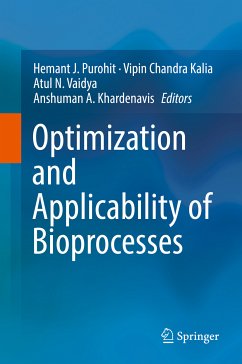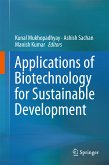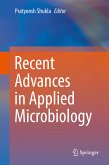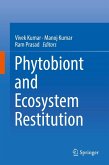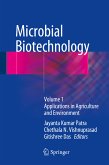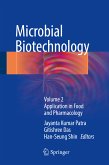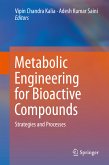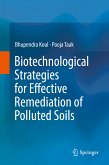Optimization and Applicability of Bioprocesses (eBook, PDF)
Redaktion: Purohit, Hemant J.; Khardenavis, Anshuman A.; Vaidya, Atul N.; Kalia, Vipin Chandra
112,95 €
112,95 €
inkl. MwSt.
Sofort per Download lieferbar

56 °P sammeln
112,95 €
Als Download kaufen

112,95 €
inkl. MwSt.
Sofort per Download lieferbar

56 °P sammeln
Jetzt verschenken
Alle Infos zum eBook verschenken
112,95 €
inkl. MwSt.
Sofort per Download lieferbar
Alle Infos zum eBook verschenken

56 °P sammeln
Optimization and Applicability of Bioprocesses (eBook, PDF)
Redaktion: Purohit, Hemant J.; Khardenavis, Anshuman A.; Vaidya, Atul N.; Kalia, Vipin Chandra
- Format: PDF
- Merkliste
- Auf die Merkliste
- Bewerten Bewerten
- Teilen
- Produkt teilen
- Produkterinnerung
- Produkterinnerung

Bitte loggen Sie sich zunächst in Ihr Kundenkonto ein oder registrieren Sie sich bei
bücher.de, um das eBook-Abo tolino select nutzen zu können.
Hier können Sie sich einloggen
Hier können Sie sich einloggen
Sie sind bereits eingeloggt. Klicken Sie auf 2. tolino select Abo, um fortzufahren.

Bitte loggen Sie sich zunächst in Ihr Kundenkonto ein oder registrieren Sie sich bei bücher.de, um das eBook-Abo tolino select nutzen zu können.
Provides a broad perspective on the use of biotechnological tools in optimizing bioprocesses
Describes the latest research in the field of applied microbiology for sustainable development
Uses simple language to lucidly explain difficult concepts
- Geräte: PC
- ohne Kopierschutz
- eBook Hilfe
- Größe: 12.29MB
Andere Kunden interessierten sich auch für
![Applications of Biotechnology for Sustainable Development (eBook, PDF) Applications of Biotechnology for Sustainable Development (eBook, PDF)]() Applications of Biotechnology for Sustainable Development (eBook, PDF)112,95 €
Applications of Biotechnology for Sustainable Development (eBook, PDF)112,95 €![Recent advances in Applied Microbiology (eBook, PDF) Recent advances in Applied Microbiology (eBook, PDF)]() Recent advances in Applied Microbiology (eBook, PDF)112,95 €
Recent advances in Applied Microbiology (eBook, PDF)112,95 €![Phytobiont and Ecosystem Restitution (eBook, PDF) Phytobiont and Ecosystem Restitution (eBook, PDF)]() Phytobiont and Ecosystem Restitution (eBook, PDF)112,95 €
Phytobiont and Ecosystem Restitution (eBook, PDF)112,95 €![Microbial Biotechnology (eBook, PDF) Microbial Biotechnology (eBook, PDF)]() Microbial Biotechnology (eBook, PDF)160,95 €
Microbial Biotechnology (eBook, PDF)160,95 €![Microbial Biotechnology (eBook, PDF) Microbial Biotechnology (eBook, PDF)]() Microbial Biotechnology (eBook, PDF)120,95 €
Microbial Biotechnology (eBook, PDF)120,95 €![Metabolic Engineering for Bioactive Compounds (eBook, PDF) Metabolic Engineering for Bioactive Compounds (eBook, PDF)]() Metabolic Engineering for Bioactive Compounds (eBook, PDF)112,95 €
Metabolic Engineering for Bioactive Compounds (eBook, PDF)112,95 €![Biotechnological Strategies for Effective Remediation of Polluted Soils (eBook, PDF) Biotechnological Strategies for Effective Remediation of Polluted Soils (eBook, PDF)]() Bhupendra KoulBiotechnological Strategies for Effective Remediation of Polluted Soils (eBook, PDF)112,95 €
Bhupendra KoulBiotechnological Strategies for Effective Remediation of Polluted Soils (eBook, PDF)112,95 €-
-
-
Provides a broad perspective on the use of biotechnological tools in optimizing bioprocesses
Describes the latest research in the field of applied microbiology for sustainable development
Uses simple language to lucidly explain difficult concepts
Describes the latest research in the field of applied microbiology for sustainable development
Uses simple language to lucidly explain difficult concepts
Dieser Download kann aus rechtlichen Gründen nur mit Rechnungsadresse in A, B, BG, CY, CZ, D, DK, EW, E, FIN, F, GR, HR, H, IRL, I, LT, L, LR, M, NL, PL, P, R, S, SLO, SK ausgeliefert werden.
Produktdetails
- Produktdetails
- Verlag: Springer Nature Singapore
- Seitenzahl: 418
- Erscheinungstermin: 2. Januar 2018
- Englisch
- ISBN-13: 9789811068638
- Artikelnr.: 53062119
- Verlag: Springer Nature Singapore
- Seitenzahl: 418
- Erscheinungstermin: 2. Januar 2018
- Englisch
- ISBN-13: 9789811068638
- Artikelnr.: 53062119
- Herstellerkennzeichnung Die Herstellerinformationen sind derzeit nicht verfügbar.
Dr. Vipin Chandra Kalia is an Emeritus scientist and ex-chief scientist at Microbial Biotechnology and Genomics, CSIR-Institute of Genomics and Integrative Biology, Delhi. He obtained his M.Sc. and Ph.D. degrees in genetics from the Indian Agricultural Research Institute, New Delhi. He has been elected as: (1) Fellow of the Association of Microbiologists of India (FAMI), (2) Fellow of the National Academy of Sciences (FNASc), and (3) Fellow of National Academy of agricultural Sciences (FNAAS). His main areas of research are microbial biodiversity, genomics and evolution, bioenergy, biopolymers, antimicrobials, quorum sensing, and quorum quenching. He has published over 100 papers in scientific journals such as (1) Nature Biotechnology, (2) Biotechnology Advances, (3) Trends in Biotechnology, (4) Critical Reviews in Microbiology, (5) Bioresource Technology, (6) the International Journal of Hydrogen Energy, (7) PLoS ONE, (8) BMC Genomics, (9) Gene, and (10) the Annual Review of Microbiology. He has an h index of 32 and an i10 index of 71. He has edited 3 books: Quorum sensing versus quorum quenching: A battle with no end in sight (2015, Springer India), and Microbial Factories Vol 1 and 2 (2015). He is currently the editor in chief of the Indian Journal of Microbiology and editor of (1) PLoS ONE, (2) the Journal of Microbiology & Biotechnology (Korea), (3) Applied Biochemistry & Biotechnology (USA), (4) International Scholarly Research Notices (Energy), (5) Dataset Papers in Science (Microbiology), and (6) the Journal of Molecular and Genetic Medicine. He is a life member of the following scientific societies: (1) the Society of Biological Chemists of India (2) the Society for Plant Biochemistry and Biotechnology, India; (3) the Association of Microbiologists of India; (4) the Indian Science Congress Association; (5) the BioEnergy Society of India, and (6) the Biotech Research Society of India (BRSI). He is also a member of the American Society for Microbiology. Dr Hemant J. Purohit is head of the Environmental Biotechnology & Genomics Division, CSIR- National Environmental Engineering & Research Institute, Nagpur He completed his PhD at Nagpur University in 1986 with support from CSIR Research Fellowships (JRF and SRF). He has training in microbial biochemistry from the Department of Biochemistry, University of Hull, UK (Commonwealth Fellowship) and also from the Laboratory of Molecular Biology, NINDS, NIH, Bethesda (Fogarty International Exchange Program Fellowship). He also developed the Environmental Genomics program at CSIR-NEERI. His key area of interest is decision making by the bacteria/ microbial community. He has been involved in designing a strategy for capturing microbial diversity by interfacing culturable and DNA fingerprinting tools; developing genomics-based monitoring tools for EIA and bio-remediation processes; studying stress-dependent microbial response using dynamic gene expression and its application in bioprocess optimization; and developing insights into microbial capacities for utilization of organics through genome sequence analysis etc. He has been project coordinator for a number of high value projects and has 225 publications to his credit. Dr Purohit is an associate editor of Applied Biochemistry & Biotechnology ; and editor of the Indian Journal of Microbiology and PLoS One. Dr. Atul N Vaidya is Head of the Solid and Hazardous Waste Management Division, National Environmental Engineering Research Institute (CSIR), Nagpur. He is also a professor at AcSIR (Academy of Scientific and Innovative Research), New Delhi. Since completing his PhD at Nagpur University in 2001, he has been involved in developing strategies for managing municipal solid waste through sustainable methods, the application of biotechnological processes and cleaner technologies for treating industrial wastewaters and the restoration of the environment through recovery of value-added products suchas biogas from the organic fraction of municipal solid waste. He has been a project leader in a number of high-value projects and has 63 publications to his credit. He is a member of the scientific advisory panels of several national and international committees and has been recognized for his work as member of the Expert Committee for Proper MSW Management at Srinagar, Jammu & Kashmir by National Green Tribunal. Dr. Anshuman A. Khardenavis is a senior scientist at the Environmental Biotechnology & Genomics Division, National Environmental Engineering Research Institute (CSIR), Nagpur. He is also an asst. professor at AcSIR (Academy of Scientific and Innovative Research), New Delhi. He completed his PhD at Nagpur University in 2011, and has been involved in developing methods and strategies for the recovery of value-added products from organic solid waste, such as keratinases from feather waste, and polyhydroxyalkanoates (PHAs) from activated sludge biomass; the design andoperation of reactors for managing organic waste through biomethanation; studying the role of substrate-specific microbial community plasticity in the efficiency of anaerobic digestion; and the evaluation of microbial capacities for the utilization of organics through genome sequence analysis. He has been a project leader in a number of high- value projects sponsored by government agencies and industries. He has 24 publications to his credit. He has received a number of prestigious awards, including a Lien Environmental Fellowship-Singapore, and CSIR-UGC Research Fellowships (JRF and SRF).
1. Visualization of microorganisms in bioprocesses.- 2. Integrated Innovative Biotechnology for Optimization of Environmental Bioprocesses and Green Economy.- 3. Bioprocess for solid waste management.- 4. Processes of microbial transformation and physical removal of polychlorinated biphenyls (PCBs) in wastewater treatment .- 5. Bioprocess development for natural indigo dye production from Indigofera plant biomass - an alternative to its synthetic counterpart.- 6. Sequestration options for Phosphorus in Waste water.- 7. Bioremediation of Terrestrial Oil Spills: Feasibility Assessment.- 8. Role of Clostridial nitroreductases in Bioremediation.- 9. Activated sludge process and Energy.- 10. Mass production of microalgae in photobioreactors for biodiesel application: Selection, limitations, and optimization .- 11. Bioflocculants and production of microalgal biomass.- 12. Biohydrogen Production: An outlook of fermentative processes and integration strategies.- 13. Development of dry anaerobic technologies of bio-waste and unlock the barriers for valorization.- 14. Modelling for anaerobic process .- 15. Biofilm Microenvironments: understanding through modelling approaches.- 16. Microbial co2 fixation bioprocesses and desert as future carbon sink.- 17. Bioprocess network for solid waste management.- 18. The Application of Computer Image Analysis in Water Toxicity Tests.
1. Visualization of microorganisms in bioprocesses.- 2. Integrated Innovative Biotechnology for Optimization of Environmental Bioprocesses and Green Economy.- 3. Bioprocess for solid waste management.- 4. Processes of microbial transformation and physical removal of polychlorinated biphenyls (PCBs) in wastewater treatment .- 5. Bioprocess development for natural indigo dye production from Indigofera plant biomass - an alternative to its synthetic counterpart.- 6. Sequestration options for Phosphorus in Waste water.- 7. Bioremediation of Terrestrial Oil Spills: Feasibility Assessment.- 8. Role of Clostridial nitroreductases in Bioremediation.- 9. Activated sludge process and Energy.- 10. Mass production of microalgae in photobioreactors for biodiesel application: Selection, limitations, and optimization .- 11. Bioflocculants and production of microalgal biomass.- 12. Biohydrogen Production: An outlook of fermentative processes and integration strategies.- 13. Development of dry anaerobic technologies of bio-waste and unlock the barriers for valorization.- 14. Modelling for anaerobic process .- 15. Biofilm Microenvironments: understanding through modelling approaches.- 16. Microbial co2 fixation bioprocesses and desert as future carbon sink.- 17. Bioprocess network for solid waste management.- 18. The Application of Computer Image Analysis in Water Toxicity Tests.
